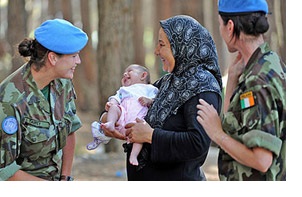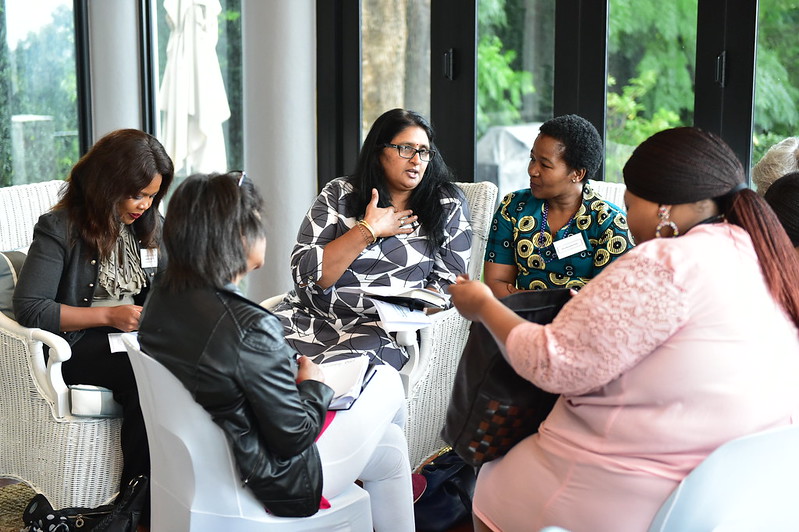Ireland's National Action Plans on Women, Peace and Security
The Women Peace and Security Agenda
The Women, Peace and Security Agenda is based on UN Resolution 1325, and 9 further related resolutions, which recognise the differential impact of conflict has on women and girls. The Women, Peace and Security Agenda is founded on the idea that due to the power dynamics of gender, conflict has different effects on women, girls, boys and men.
Learn more about the agenda in Ireland's Simple Guide to the WPS.
One of the most important elements of the Women, Peace and Security Agenda is its application and implementation by Member States through National Action Plans. Over 100 UN Member States currently have National Action Plans. Ireland is on its Third National Action Plan in since June 2019. The implementation of the National Action Plan is monitored by the Oversight Group appointed.
- UNSCR 1325
- Ireland's Third National Action Plan
- Ireland’s Previous National Action Plans
- Newsletters and Reports
UNSCR 1325
United Nations Security Council 1325
United Nations Security Council Resolution (UNSCR) 1325 was adopted in 2000. Its adoption was an important watershed marking global recognition of the unique and disproportionate impact of conflict on women and girls, and the importance of their participation in decision-making in conflict and post-conflict situations.
 The binding commitments of UNSCR 1325 strive towards the full and equal participation of women in decision-making processes around issues related to peace and security; for the protection of women and girls from gender-based violence; and the implementation of gender perspectives in all peace-making and peace building strategies undertaken by the United Nations and its Member States.
The binding commitments of UNSCR 1325 strive towards the full and equal participation of women in decision-making processes around issues related to peace and security; for the protection of women and girls from gender-based violence; and the implementation of gender perspectives in all peace-making and peace building strategies undertaken by the United Nations and its Member States.
UNSCR 1325 has been complemented and strengthened by the adoption of UNSCR 1820 (2008), UNSCR 1888 (2009), UNSCR 1889 (2009), UNSCR 1960 (2010), UNSCR 2106 (2013), UNSCR 2122 (2013), UNSCR 2242 (2015) and UNSCR 2467 (2019), all of which Ireland co-sponsored. Taken together, these resolutions comprise the Women, Peace and Security (WPS) Agenda.
Ireland's Third National Action Plan
Ireland's Third National Action Plan on Women, Peace and Security
The Third National Action Plan (2019-2024) was launched on 21 June 2019 by then Tánaiste and Minister for Foreign Affairs and Trade, Simon Coveney T.D. The development of Ireland's Third National Action Plan on the Women, Peace and Security Agenda was led by a Working Group appointed by the Tánaiste and was made up of 50 per cent government and 50 per cent civil society.
The Action plan was drafted based on the findings of:
- The Mid Term and the Final Review for the Second National Action Plan.
- A call for written submissions which took place in November/December 2018. 49 written submissions were received.
- Two Consultation Workshops which were held in Cork on the 17th January and Dublin on the 23rdJanuary (a preparatory conference was held in Cork on December 6th for women coming from conflict/post conflict affected areas living in Ireland). Over 100 participants from civil society, academia and government represented at each workshop.
Details of this process, including the submissions, can be found on our dedicated webpage.
Our Third National Action Plan on Women, Peace and Security is also available in Irish/as Gaeilge.
Annual Reports on the third National Action Plan (NAP)
third Annual Report was published in December 2023 and reflects the important work done in 2022 to advance the Women, Peace and Security agenda both in Ireland and internationally. The report is structured in line with the four key pillars of the NAP, namely Prevention, Participation, Protection and Promotion, and highlights the projects and programmes carried out by various Government Departments throughout the third year of the NAP's implementation.
As part of its monitoring and reporting requirements, the NAP contains a commitment to present an Annual Report to the Joint Oireachtas Committee on Foreign Affairs and Defence (JCFAD). Annual Reports also resembles an important means of assessing the implementation and impact of the third National Action Plan on a continuous basis. The Monitoring Framework used in the third Annual Report incorporated some of the recommendations made following the Mid-Term Review process in 2023, which identified issues surrounding reporting and adaptability. A Final Report on the third NAP will be published at the end of the NAP's five-year implementation term.
The first Annual Report (2020) is available here. The second Annual Report (2021) is available here.
Ireland’s Previous National Action Plans
Ireland’s previous National Action Plans
Ireland's First National Action Plan/WPS An Chéad Tuarascáil Bhliantúil launched in November 2011. It was drafted following on from an interdepartmental governmental and civil society consultation process and an international cross-learning initiative, involving women from Timor-Leste, Liberia and Ireland/Northern Ireland. It was launched on 25th November 2011 at the Annual Seminar of the Irish Consortium on Gender-Based Violence by the Tánaiste and Minister for Foreign Affairs and Trade, Eamon Gilmore, and former President Mary Robinson. A Mid-Term and Final Review were conducted to inform the Second National Action Plan.
The Second National Action Plan (2015-2018) was launched in January 2015 by Minister for Foreign Affairs and Trade, Charlie Flanagan T.D. It was drafted by a Consultation Group (appointed by the Minister for Foreign Affairs and Trade) with equal representation from government and civil society organisations.
The Final Review of the First National Action Plan, a public consultation and a public workshop, with over 100 statutory, civil society and academic participants, informed the writing of the plan. The plan is structured around the four pillars (prevention, participation, protection, relief and recovery, and promotion of the agenda), each with a number of objectives, and establishes clear actions and target timeframes. The built-in monitoring mechanisms and the unique dual focus (both international and domestic) of Ireland's National Action Plan have been highlighted by both the United Nations and the European Union as examples of best practice.
An Oversight Group chaired independently by Nora Owen was established to oversee the implementation of Ireland's second National Action Plan on Women, Peace and Security. The Conflict Resolution Unit, Department of Foreign Affairs and Trade, is the Secretariat for the group. Further information is available on the Oversight Group page.
Newsletters and Reports
Newsletters
Report: Building Peace from the Grassroots: Learning from Women Peacebuilders to Advance the WPS Agenda
As we commemorate the anniversaries of both the Beijing Declaration and of UNSCR 1325, numerous reports serve as blunt reminders that we have not done enough to advance the Women Peace and Security Agenda.
Taking inspiration from grassroots leaders and wishing to hear directly from them and learn from their experience, Ireland, in collaboration with UN Women and the Global Network of Women Peacebuilders (GNWP), brought together women peacebuilders from different backgrounds and contexts in Colombia, Northern Ireland, South Africa and Uganda. Through consultations that focused discussions on the six priority areas outlined in the UN Secretary-General’s 2019 we were able to take stock of the WPS agenda in 2020 and compile their views and recommendations in a report compiled by GNWP.
It is important to note that as we were witnessing the growing impact of the pandemic on women worldwide, it was agreed that second consultations, on a smaller scale will be held so that the report can also document and disseminate information about gendered impacts of the COVID-19 pandemic, and women-led responses to it, in order to provide global, regional, national and local authorities with information and analysis necessary to develop gender- and conflict-sensitive crises responses.

